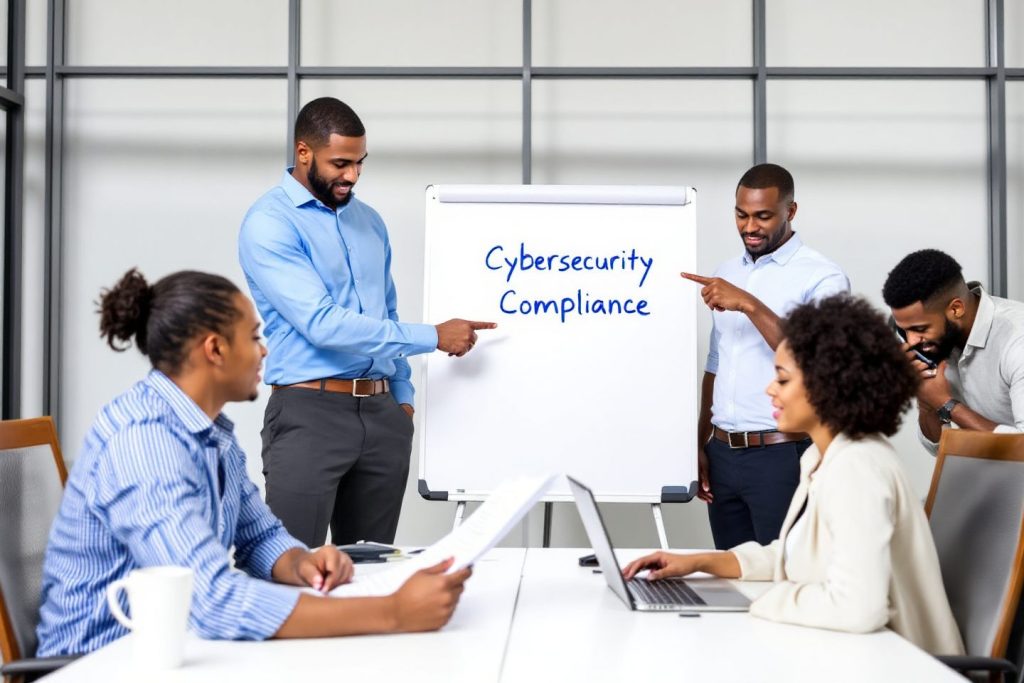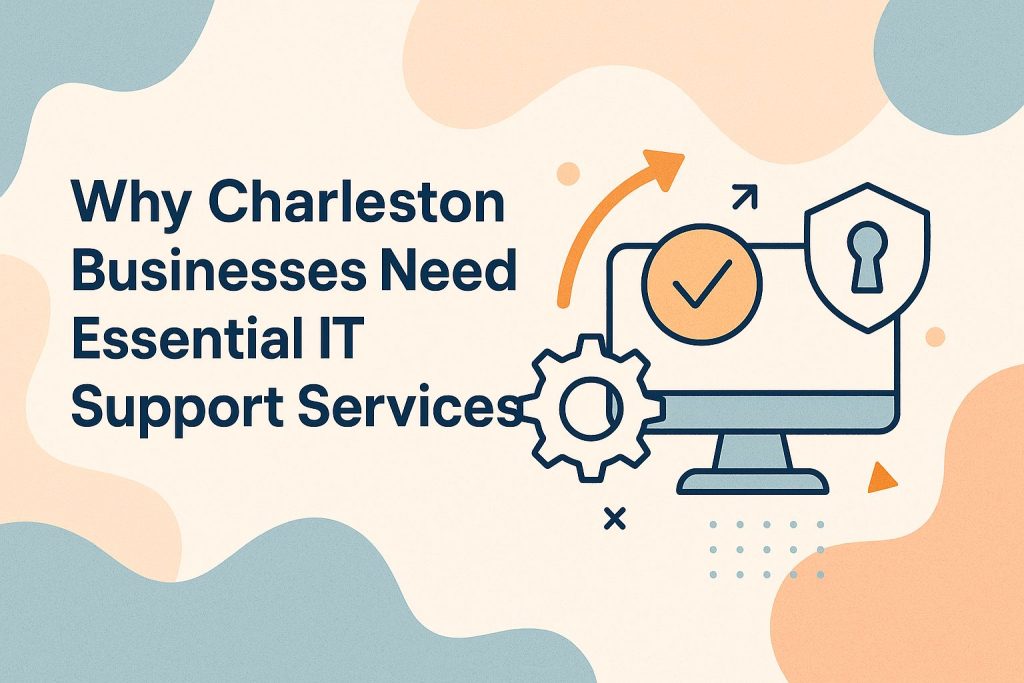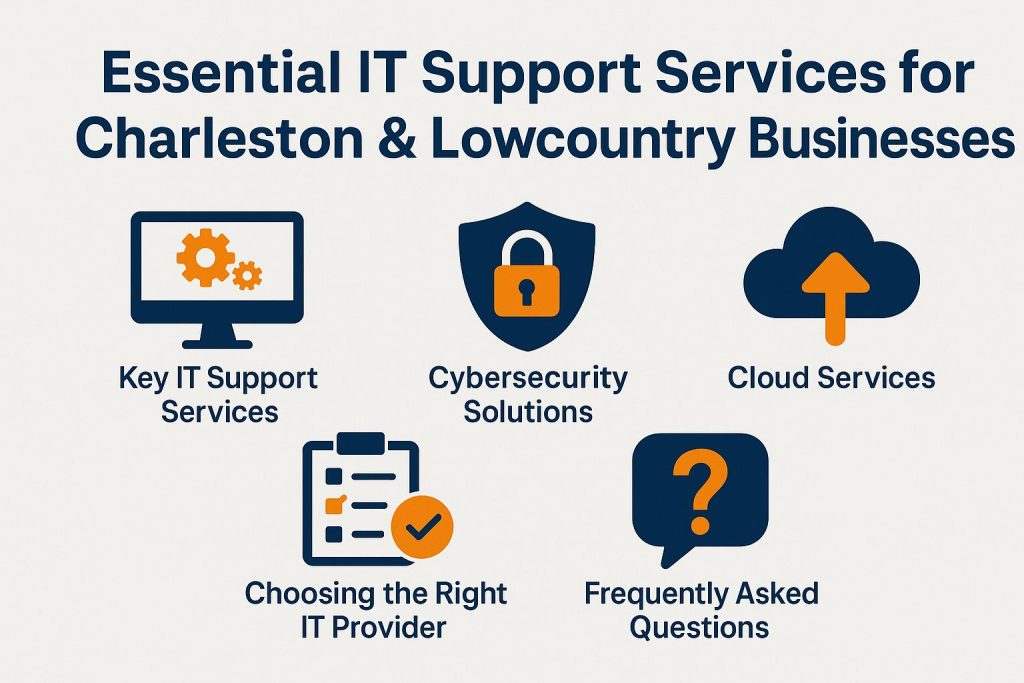Essential Cybersecurity Best Practices for Charleston Businesses

In today’s digital landscape, safeguarding sensitive information is crucial for businesses in Charleston, SC. As cyber threats become increasingly sophisticated, companies must adopt robust cybersecurity practices to protect their data and maintain compliance.
This guide explores key strategies every organization should implement, including software updates, employee training, strong access controls, monitoring systems, and layered defenses like firewalls and antivirus protection.
By embracing these best practices, Charleston businesses can build stronger security foundations, enhance compliance, and protect their future.
1. Keep Software and Systems Updated
Regular updates are the first line of defense against cyber threats. Outdated software often contains vulnerabilities that hackers exploit.
By consistently applying updates and patches, companies ensure their systems align with frameworks like NIST and GDPR, reducing exposure to cyber risks.
Neglecting updates not only increases the risk of breaches but can also lead to compliance violations and costly fines. Regular audits and a proactive update schedule keep systems resilient and reputations intact.
👉 Explore how Charleston IT services can help businesses stay updated and compliant.
2. Train Employees to Recognize Threats
Human error is a leading cause of security breaches. Therefore, training employees on cybersecurity protocols is essential.
Programs should include real-world simulations, phishing awareness, and clear guidelines for handling sensitive data. Ongoing training ensures that staff stay alert to evolving threats and understand the impact of non-compliance.
Organizations that invest in employee education foster a security-first culture, minimizing the risks of internal mistakes.
3. Strengthen Access Controls with Strong Passwords and MFA
Strong passwords and multi-factor authentication (MFA) are crucial for protecting access to systems.
Employees should use complex passwords combining letters, numbers, and special characters — for instance, “Secure!Access#2024” is much stronger than simple phrases. In addition, enabling MFA requires an extra verification step, dramatically reducing the chance of unauthorized access even if a password is compromised.
👉 For added support, our IT security services provide tailored access management solutions.
4. Implement Firewalls and Antivirus Protection
A solid cybersecurity strategy must include firewalls and antivirus software. Firewalls act as a barrier between secure internal systems and external threats, while antivirus programs scan for and eliminate malicious software.
Both tools must be regularly updated to remain effective against the latest cyber threats. Using a combination of hardware firewalls for networks and software firewalls for individual devices maximizes protection.
5. Conduct Routine Security Assessments
Identifying vulnerabilities before hackers do is critical.
Routine vulnerability scans and penetration testing reveal weaknesses in software configurations, access controls, and security protocols. By addressing findings quickly, businesses can prevent small issues from escalating into major incidents.
👉 Learn more about proactive monitoring with our managed IT support.
6. Build a Reliable Data Backup and Recovery Plan
A strong backup and recovery strategy ensures that data remains protected even in the event of a cyberattack.
Effective plans typically include a combination of on-site backups for fast recovery and cloud backups for protection against physical disasters. Furthermore, businesses should regularly test recovery procedures to ensure quick response times and minimal data loss.
This approach supports both operational resilience and regulatory compliance.
7. Monitor Network Activity for Suspicious Behavior
Constant network monitoring is vital for early threat detection.
Intrusion detection systems (IDS), log management solutions, and traffic analyzers help IT teams quickly identify unusual activity. By establishing a baseline for normal behavior, businesses can more easily spot anomalies that indicate potential breaches.
Fast alerts and rapid responses can prevent minor incidents from becoming major security crises.
8. Limit Access to Sensitive Information
Access control is another critical component of cybersecurity.
Implementing role-based access controls (RBAC) ensures that employees can only access data necessary for their specific duties. Regular audits help ensure permissions remain appropriate as roles and teams evolve.
Ultimately, this approach minimizes insider threats and limits the potential impact of compromised accounts.
9. Stay Current with Compliance Regulations
Compliance is a moving target. Laws such as GDPR, HIPAA, and PCI DSS frequently evolve, requiring businesses to adjust policies accordingly.
Conducting regular compliance audits helps companies stay aligned with regulations and avoid costly fines. Appointing a Data Protection Officer (DPO) and performing Data Protection Impact Assessments (DPIAs) strengthens compliance efforts and builds trust with customers.
👉 See how our Charleston service areas support regulatory compliance across industries.
10. Develop a Robust Cyber Incident Response Plan
No system is foolproof. That’s why having a clear incident response plan is essential.
The plan should define roles, communication procedures, containment strategies, and recovery steps. Regular testing and updates ensure readiness when facing new threats.
Additionally, conducting post-incident reviews identifies weaknesses and improves future response capabilities.
Common Cybersecurity Threats for Charleston Businesses
Businesses face a variety of cyber risks, including:
-
Phishing emails tricking employees into giving up credentials
-
Malware infections compromising systems
-
Ransomware attacks locking critical data
-
Social engineering tactics exploiting human trust
By implementing proactive strategies and working with trusted IT partners, Charleston businesses can significantly reduce their exposure to these threats.
👉 Learn how our cybersecurity services can defend against today’s top threats.
Why Compliance Matters
Failure to comply with cybersecurity regulations can result in heavy penalties, reputational damage, and operational setbacks.
High-profile breaches like Equifax and Marriott illustrate the financial and legal risks of non-compliance. Therefore, businesses must prioritize strong data protection strategies, regular audits, and continuous employee education.
Moreover, demonstrating a commitment to cybersecurity boosts customer confidence and strengthens brand loyalty.
Final Thought
Charleston businesses that proactively implement cybersecurity best practices not only protect themselves from costly attacks but also position their organizations for sustainable success.
By focusing on updates, employee training, access controls, network monitoring, and compliance, companies create a stronger, more resilient digital environment.
For tailored solutions that fit your business needs, contact our Charleston cybersecurity experts today.




